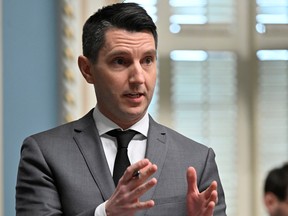“It tells me: ‘no appointments meeting your search criteria are available at the moment.’”

Article content
QUEBEC — Liberal MNA André Fortin took advantage of a committee hearing on budgetary appropriations Tuesday to show Health Minister Christian Dubé how difficult it is to obtain a medical appointment.
In the middle of a hearing, Fortin went to the “Rendez-vous Santé Québec” website to try to obtain a consultation with his own family doctor in Outaouais.
Article content
“It tells me: ‘No appointments meeting your search criteria are available at the moment,’” the MNA for Pontiac read aloud.
Advertisement 2
Article content
He then tried to obtain an appointment with another health professional from the same family medicine group, then in a clinic within a 25-kilometre radius, without success.
“What are we doing?” he asked Dubé, who suggested he use the digital Primary Care Access Point (GAP).
Fortin said that his assistant, who does not have a family doctor, recently tried her luck with GAP in Outaouais, but was unable to get an appointment.
“So what should this person do?” repeated Fortin, emphasizing that the government is asking Quebecers not to go to emergency rooms.
Fortin said that the Clic Santé portal often directs patients to paid services from private clinics.
Dubé noted that family doctors have committed to providing 900,000 appointments annually. He will know in two weeks whether those time slots are indeed made available to Quebecers.
Dubé’s team revealed on Tuesday that the “crisis unit” set up in 2022 to improve the situation in emergencies will be maintained.
Fortin said occupancy rates in several emergency rooms in the province are so high that they put the lives of patients at risk. “The situation has not changed at all,” he said.
Article content
Advertisement 3
Article content
The assistant deputy minister, Dr. Stéphane Bergeron, replied that the crisis unit meets every two weeks, and that it met last Friday.
“There is a clear desire to perpetuate an operational unit that has a ‘focus’ on how to reduce the average length of stay in the emergency room, improve emergency care,” he said.
Fortin said the Coalition Avenir Québec had promised in 2018 to reduce the wait to 90 minutes on average to see a doctor in an emergency room. Only four of the 115 ERs in Quebec had 90-minute wait times, he said. At Anna-Laberge Hospital in Châteauguay, the wait is currently 13 hours and four minutes.
The CAQ also promised during the 2022 election campaign to build two private mini-hospitals, one in Montreal and the other in Quebec, to relieve congestion in the health system.
Tuesday, Québec solidaire health critic Vincent Marissal questioned Dubé about the conversion of these mini-hospitals that he saw announced in the appropriations.
Dubé confirmed that the mini-hospitals will ultimately be converted into geriatric clinics, “much more oriented toward the needs of an aging clientele.”
Recommended from Editorial
Advertisement 4
Article content
Article content





